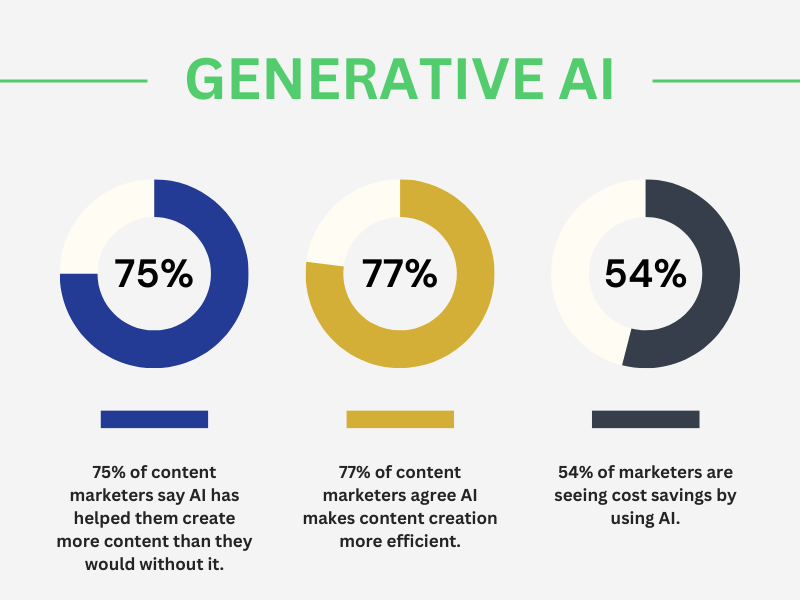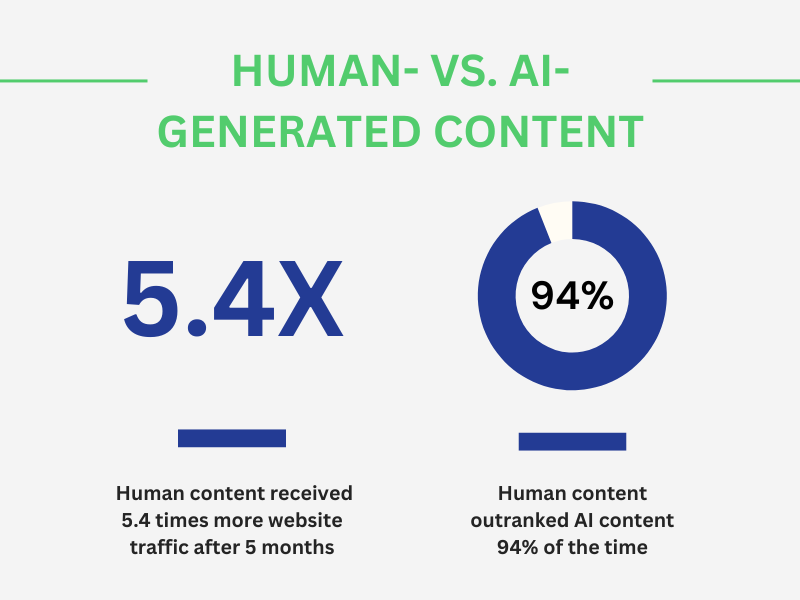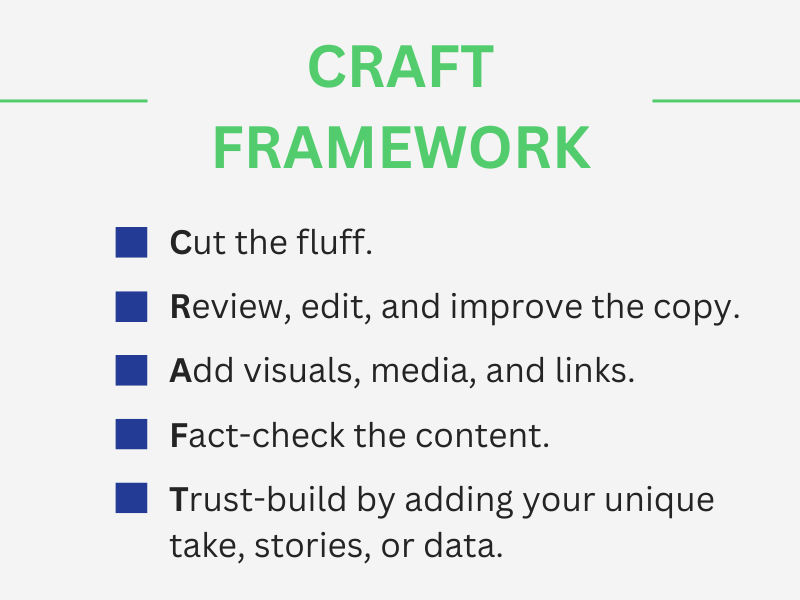Generative AI stole the spotlight last year as the “next big thing” in content marketing. Companies of all sorts and sizes saw opportunities to create more content quickly and inexpensively. But has AI lived up to the tall task of better content marketing?
The data doesn’t lie:
Data only tells part of the story, though. While many marketers may agree on certain benefits of using AI in content creation, these benefits aren’t guaranteed, nor are they as black and white as they seem.
With more than a year of AI tools like ChatGPT stealing headlines, we’re taking a step back to see how AI tools have impacted content marketing. Here’s a combination of our own observations of AI-generated content and data that highlights its impact on content marketing.
1. Yes, AI Content Can Hurt SEO (But Not How You Might Think)
Many marketers see AI tools as a shortcut to content creation. They think if they can create content faster, then they can create more content and dominate the rankings. More content means more opportunities to drive traffic and engage audiences. They can do more with fewer resources.
More than a year later, we know now this simply isn’t true.
Google initially warned against AI content, citing it goes against their spam policy. However, Google has since reversed course and says it rewards high-quality content regardless of how it’s produced.
That’s the keyword: high-quality content.
AI is capable of producing high-quality content, but not by itself. If you’re using AI to write entire articles, there’s probably nothing unique about them. AI tools like ChatGPT are language models, which means they’re not creating new takes on ideas, but rather regurgitating and synthesizing what’s already been said on a topic.
Not only does this run the risk of plagiarism, but it also lacks the opportunity to infuse real value that other content doesn’t have.
When you create low-quality content, you’re harming your SEO efforts:
- Bounce rates and page dwell times decrease because people don’t want to waste time on poor-quality content.
- You build a reputation of being a low-quality content producer, which can ward off repeat visitors.
- You have nothing unique to share with your audience, making it hard to stand out.
While AI doesn’t directly impact your rankings either way, it’s important to use AI to help your content strategy, not harm it.
©StockSnap via Canva.com
2. AI Content Doesn’t Save as Much Time as You Think
Creating content takes time, with or without AI. It’s not something you can put on autopilot.
You spend time coming up with and choosing topics, doing keyword research, writing the content, proofreading and editing, fact-checking, adding visuals and links, and loading the content in your CMS or website. AI can help with some of these things, but each requires some level of human oversight.
Neil Patel shares results from a recent in-house study. In this study, using AI to write an article, load it into a CMS, and publish took an average of 16 minutes. This same process using humans took an average of 69 minutes. (Specifics on the length and complexity of the articles weren’t shared.)
But the time savings in this study didn’t outweigh the benefits of using human-generated content.
For starters, human content outranked AI content 94.12% of the time. Human content also received significantly more website traffic and visitors spent more time reading the content.
No matter how you create content, it’s going to require some time and effort. And spending a little more time creating content “the old-fashioned way” can give you better results overall (which is why you create content in the first place, right?).
A better way to put content on autopilot is to outsource it to a professional writer. Agencies like Content Pros can deliver ready-to-publish content, help come up with ideas and keywords, and ensure high-quality writing without the use of AI tools.
3. AI Can Produce Decent Content (But Should You Use It?)
Generative AI tools use natural language processing to understand topics and write about them cohesively. These tools can form a proper sentence. And in some cases, you might get decent material that’s ready to copy and paste into your article.
But should you use it?
The jury is split. In one survey, about half of consumers say they wouldn’t trust a brand’s content if they knew it was generated by AI. Less than 10% of respondents in a different survey say they think AI writing is superior to human writing. Regardless, most consumers think brands should be transparent about using AI to write content.
Case in point: CNET caused some outrage with its AI-written articles due to simple errors and a lack of transparency.
Keep in mind that most AI tools place a watermark on the content they generate. This watermark is added to the content’s metadata to show that AI tools generated it.
These models also follow basic patterns and programming, which are easy for search engines to detect. Google and other search tools are getting better at recognizing AI writing because, while generally sensical, the writing still sounds robotic. Humans are getting better at recognizing AI content, too.
Also, keep in mind that just because content is factual and sensical doesn’t mean it’s fun to read. AI writing comes in a single flavor. There’s nothing unique about its tone or style of voice. That makes it hard to associate AI content with your brand.
Remember, the whole point of content writing is to connect with your human audience. If customers don’t like it, distrust it, or otherwise won’t read it, no amount of time- or cost-savings will benefit you in the long run.
If you’re going to use AI for any part of your content writing, we suggest applying the CRAFT framework:
Granted, editing AI content can take substantial time—and in many cases, it might be faster and easier to write original copy and skip the AI tools altogether.
4. We Need Professional Human Writers Now More than Ever
AI writing is emerging as a skill set in content writing, with professional writers learning how to balance AI tools with human expertise. Working with experienced AI writers can help you get the best of both worlds without having to figure out this new landscape on your own.
But human writers can do more than apply AI tools to your strategy. They can also:
- Infuse your brand’s tone and style of voice into every piece of content
- Incorporate your original data or research
- Optimize content for search
- Add internal and external links, visuals, and media
- Make your content relatable
- Fact-check information
- Strengthen content with third-party data sources
With AI’s hallucinations, bland style, lack of fact-checking, and inability to produce complete and high-quality content (think ready-to-publish content with all the links, images, media, and SEO best practices), the value of human writers remains strong.
Also, since AI language models use published content to learn and iterate, it’s important that brands and publishers create quality content to help continue training these models. If content quality declines in an effort to save time and money and produce a greater volume, the AI tools upon which you rely might also decline in quality, meaning you’ll need to invest more time and effort into editing and optimizing their outputs.
Human writers still offer the best value for time, money, and results. AI is best used as a complementary tool, not a do-it-all content-producing machine.
Final Thoughts on AI in Content Marketing
AI isn’t going anywhere, especially in content marketing. With language models like ChatGPT learning and improving over time, they offer content marketers a way to offload some of their content creation tasks.
But AI will never be a full replacement for human writers if you want your writing to mean something to real people. It’s important to learn what AI’s strengths are in content marketing and how they can supplement the expertise of human talent.
At Content Pros, we continue to employ expert human writers to help our clients produce high-quality content with a purpose. Contact us today to receive a discount on your first project!





